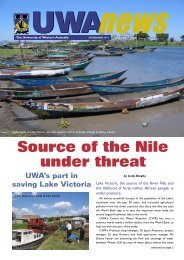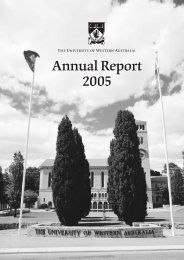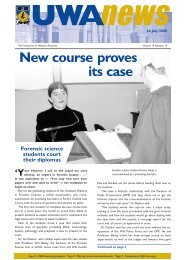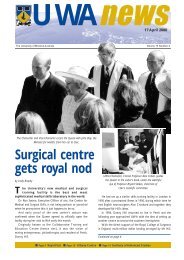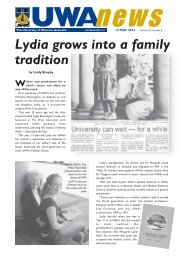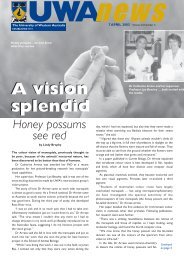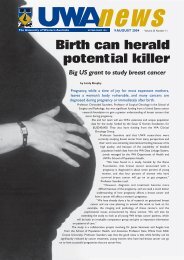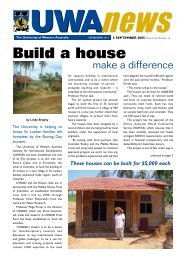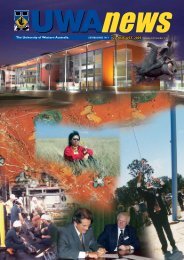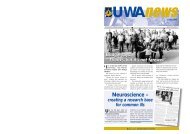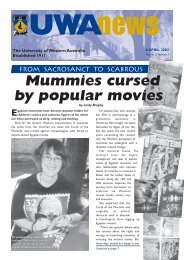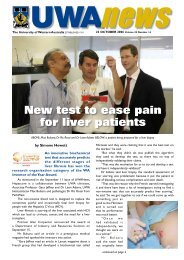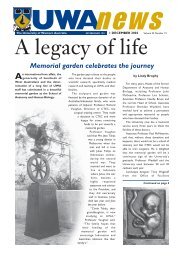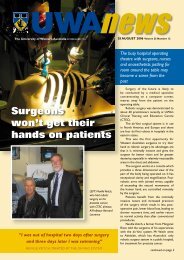10 Mar: Vol 22, #1 - Publications Unit - The University of Western ...
10 Mar: Vol 22, #1 - Publications Unit - The University of Western ...
10 Mar: Vol 22, #1 - Publications Unit - The University of Western ...
- No tags were found...
You also want an ePaper? Increase the reach of your titles
YUMPU automatically turns print PDFs into web optimized ePapers that Google loves.
news UWA<strong>10</strong> MARCH<strong>The</strong> <strong>University</strong> <strong>of</strong> <strong>Western</strong> Australia ESTABLISHED 1911A premierdevelopmentfor UWAby Lindy BrophyAn outstanding new building on Fairway — StageOne <strong>of</strong> UWA’s Innovation Precinct — provides aperspective <strong>of</strong> an important future direction <strong>of</strong>the <strong>University</strong>.With its spectacular soaring wings, itsgleaming stainless steel and green glass, thebuilding houses the Motorola S<strong>of</strong>twareCentre and points the way to a brightfuture in information andcommunications technology (ICT).But the use <strong>of</strong> traditionalmaterials — limestone andcopper — echo the originalbuildings on campus, andcement the link betweenMotorola, one <strong>of</strong> theworld’s leading ICT2003 <strong>Vol</strong>ume <strong>22</strong> Number 1companies, and thetime-honouredteaching and learningtraditions <strong>of</strong> one <strong>of</strong> futureAustralia’s leadinguniversities.<strong>The</strong> $50 million joint UWA-Motorola-State Government project, opened by thePremier last week, is expected to engageabout 200 people within five years in theengineering <strong>of</strong> new computer s<strong>of</strong>tware.This will increase employmentopportunities for UWA graduates andmake viable the expansion <strong>of</strong> the<strong>University</strong>’s <strong>of</strong>ferings in the ICT field.Already, collaboration betweenMotorola and UWA has resulted in thedevelopment <strong>of</strong> two new double-degreeprograms which started last year. <strong>The</strong>seContinued on page 4leading thecommunityinto the
2 UWAnewsVCariousthoughts …2003<strong>The</strong> ChallengesIn the past weeks we have welcomed new staff toUWA and inducted the student class <strong>of</strong> 2003. <strong>The</strong>Festival is drawing to a close. <strong>The</strong> major committeeshave begun work. Senate has had its strategic agendasession. <strong>The</strong> senior managers’ forum has re-assembled.<strong>The</strong> Executive has set agendas for the year … and I havechaired the first AVCC Board <strong>of</strong> Directors’ meeting <strong>of</strong>2003.<strong>The</strong> new academic year is truly here and it is likely to be atruly significant year.Forward-looking signs abound for UWA, as we work toachieve international excellence — the driving concept <strong>of</strong> ourOperational Priorities Plan. Quite apart from the fact <strong>of</strong> theopening <strong>of</strong> the magnificent Innovation Precinct (toaccommodate Motorola’s international s<strong>of</strong>tware laboratoriesin collaboration with our science and engineering faculties)and the beginnings <strong>of</strong> the construction <strong>of</strong> our new learningcomplex (incorporating a magnificent new <strong>University</strong> Club toreplace <strong>University</strong> House) together with initiation <strong>of</strong> ourrefurbished Senate chamber to serve the reformed governingbody ... we shall see our new Schools and Faculties in fulloperation.<strong>The</strong>re will also be very considerable challenges.Preparations for the Australian Universities Quality Agency(AUQA) audit and under way and will require considerablepresentation and intense interaction by many <strong>of</strong> us. Yetdeeper matters also exist. How we handle these fundamentalissues will be crucial to our future as a university <strong>of</strong>excellence.Perhaps most immediately significant <strong>of</strong> all will be theoutcomes <strong>of</strong> the Crossroads Review <strong>of</strong> higher educationinitiated by Minister Nelson and in which AVCC (and our<strong>University</strong>) played a major role. Cabinet has met (February 18,2003) and the framework for the future has gone to theExpenditure Review Committee <strong>of</strong> Government, out <strong>of</strong> whichwill come recommendations for resourcing the sector as part<strong>of</strong> the national Federal budget on May 13.UWAnewsEDITOR/WRITERLindy BrophyTel.: 9380 2436 Fax: 9380 1192 Email: lindy.brophy@uwa.edu.auEDITOR-IN-CHIEFColin Campbell-FraserTel: 9380 2889 Fax: 9380 <strong>10</strong>20 Email: ccampbell@admin.uwa.edu.auDesigned and typeset by <strong>Publications</strong> <strong>Unit</strong>, UWAPrinted by UniPrint, UWAUWAnews online: www.publishing.uwa.edu.au/uwanews/Just what emerges from the ‘package’ — both in financialand policy terms — and how we take up its opportunities andchallenges, will be as vital as the Dawkins’ era <strong>of</strong> some decadeago. At all levels <strong>of</strong> the <strong>University</strong>, we shall need to engage inthat process <strong>of</strong> implementation — with major consequencesfor our budgets, research pr<strong>of</strong>iles and educational programs.A second great challenge will relate to budgeting andincome. Meeting our goals requires substantial growth <strong>of</strong> ourtotal operating budget, with greater and greater incomediversification to meet the gap in Federal funding for researchand educational programs in requiring high quality in all ouroutcomes and services, as well as providing the kind <strong>of</strong> ‘untied’funds which support new initiatives,Depending on how the Crossroads review delivers newfunds — or not! –– we will be addressing absolutelyfundamental funding issues, with new strategies to cope in atough external environment. That, too, will involve all <strong>of</strong> us oncampus.Finally, an increasingly unstable and conflicted globalenvironment could present us with some acute planning issues– especially relating to our international student markets, boththe students incoming and in the success <strong>of</strong> our transnationalprograms overseas. As I write these words the temperature <strong>of</strong>global conflict rises. <strong>The</strong> terrorist threat in general; theregional crises — and not least in Palestine/Israel, and theKoreas; plus <strong>of</strong> course the apparently inexorable march towar in Iraq.Who can forecast what all that will mean, other thanenormous challenges as we attempt to match internationalinstability with appropriate UWA policy initiatives to sustainour involvement in the global educational ‘revolution’.2003 is the 90th year since UWA first admitted students toits classes and the <strong>University</strong> began its remarkable journey tointernational excellence. I believe that this academic year willcome to be seen in our history as one <strong>of</strong> those critical times.Indeed, jogging on the campus in the stillness <strong>of</strong> dawn theother morning left me with the sense <strong>of</strong> the ‘quiet before astorm’. But also a confidence in our future, for I know I canrely on all members <strong>of</strong> the UWA community — staff andstudents alike — to engage in the great challenge <strong>of</strong> 2003 withthe sort <strong>of</strong> dedication and spirit that will ensure our future inthese exceptional and difficult days.Pr<strong>of</strong>essor Deryck SchreuderVice-Chancellor and Presidentvc@acs.uwa.edu.auTHE UNIVERSITY OF WESTERN AUSTRALIA • <strong>10</strong> MARCH 2003
UWAnews 3<strong>The</strong> new solar power station on top <strong>of</strong> theengineering building generates enoughpower to run an average domestic home.Its designer, UWA’s radiation safety <strong>of</strong>ficer (andun<strong>of</strong>ficial alternative energy expert) Jonathon Thwaitescan say this confidently because his own family home inCottesloe runs on solar power.Mr Thwaites, a physicist, designed and installed hishome’s energy system in 2000 immediately after theFederal Government introduced a rebate scheme forrenewable energy installations.“I’ve been talking to people about solar energy herefor four years, since starting at UWA” Mr Thwaites said.<strong>The</strong> station, comprising 24 solar panels on a ro<strong>of</strong>above the first floor <strong>of</strong> the engineering building, isproviding about 15 kiloWatt hours <strong>of</strong> energy a day. It isused to top up the power needs <strong>of</strong> the building.<strong>The</strong> site was chosen because it has a flat ro<strong>of</strong>, railingalready installed, for safety, and unobstructed sunshine.<strong>The</strong> system was funded by the Office <strong>of</strong> FacilitiesManagement and the <strong>University</strong> is anticipating a $<strong>10</strong>,000rebate from the Australian Greenhouse Office.“At a guess, I’d say this station could make about$1,000 worth <strong>of</strong> energy and six Renewable EnergyCertificate (RECs) each year,” Mr Thwaites said. <strong>The</strong>power station will be registered with the Office <strong>of</strong> theRenewable Energy Regulator in Canberra.In the two months since its installation, it has poweredhalf a megaWatt hour <strong>of</strong> electricity, so it is expected toproduce about six megaWatt hours in a year.Mr Thwaites has three projects associated with thestation already prepared for honours students. He has aweather station ready to be installed on the ro<strong>of</strong> andhopes, with the help <strong>of</strong> a student, to implement datalogging for both the solar power station and the weatherstation.Powerstationlets thesunshine inUWA has the equal highest energyefficiency <strong>of</strong> all Australian universities“We could also build a Web kiosk, and install it in thefoyer <strong>of</strong> the engineering building, where anybody can seethe logged data. At the moment, you have to pay forweather data — but we could provide it for the<strong>University</strong> at no cost,” he said.UWA already has a good reputation for its energyuse, thanks mostly to OFM staff who have redesignedand retro-fitted <strong>University</strong> systems, to give us the equalhighest efficiency rating <strong>of</strong> all Australian universities.At the commissioning <strong>of</strong> the power station in January,the Deputy Vice-Chancellor, Pr<strong>of</strong>essor Alan Robson, saidit was further evidence <strong>of</strong> UWA’s commitment tosustainability and energy efficiency.Pr<strong>of</strong>essor Robson acknowledged the support <strong>of</strong> theState Government, through the Sustainable EnergyDevelopment Office, especially for their assistance withthe greenhouse rebate application.THE UNIVERSITY OF WESTERN AUSTRALIA • <strong>10</strong> MARCH 2003
4 UWAnews<strong>The</strong> Premier, Dr Ge<strong>of</strong>f Gallop is welcomed to the Innovation Precinctby UWA’s Chancellor and Vice-Chancellor and Motorola executives,Dr Terry Heng and John GherghettaContinuedfrom page 1programs are in computer science/mathematicscombined with engineering and have beendeveloped to provide the ICT industry withgraduates that have a strong grounding in computer science,s<strong>of</strong>tware engineering, mathematics, electronic engineering andcommunications engineering.<strong>The</strong> Vice-Chancellor, Pr<strong>of</strong>essor Deryck Schreuder, said theco-location <strong>of</strong> Motorola with the <strong>University</strong> would provideconsiderable benefits for UWA. “<strong>The</strong>se benefits includeMotorola involvement in teaching, supervision <strong>of</strong> researchstudents, work placements <strong>of</strong> undergraduate students, and closelinkages between staff <strong>of</strong> both Motorola and UWA,” he said.Pro Vice-Chancellor (Research and Innovation), Pr<strong>of</strong>essorRobyn Owens, said Motorola staff were already involved in theSchool as guest lecturers for undergraduate units in thes<strong>of</strong>tware engineering degree, and as mentors for third-yearstudents.According to former head <strong>of</strong> Electrical and Electronic andComputer Engineering, Pr<strong>of</strong>essor Laurie Faraone, severalstudents have been already working on projects over thesummer with Motorola staff as their joint honours supervisors.“Motorola staff are on our School’s industry advisory paneland the company has already set up four prizes, to be awardedfor the first time this year, to the top four female students inthe School,” Pr<strong>of</strong>essor Faraone said.He said Motorola was in favour <strong>of</strong> affirmative action toencourage women into the ICT industry. <strong>The</strong> currentenrolment included about <strong>22</strong> per cent women, which was a farhigher percentage than in similar courses in other Australianuniversities.“But still this is not a true representation <strong>of</strong> the extent <strong>of</strong>our potential relationship with Motorola. While they are stillbased in the city, it is difficult for students and Motorola staff tomove easily between the S<strong>of</strong>tware Centre and our School.“When operations have completely moved to Fairway, thingswill really start to happen,” he said.<strong>The</strong> Head <strong>of</strong> the School <strong>of</strong> Computer Science and S<strong>of</strong>twareEngineering, Dr Nick Spadaccini, said Motorola and severalSchools at UWA were working together to develop smartsensors, a system able to provide environmental informationmonitoring, using wireless embedded sensor networks.“<strong>The</strong> relationship is symbiotic: Motorola will provide theindustrial viewpoint on the technologies being adopted, andUWA personnel will assist in developing the next generation <strong>of</strong>communication technologies,” Dr Spadaccini said.<strong>The</strong>re are plans for the <strong>University</strong> to provide a Masters <strong>of</strong>Engineering degree for a large proportion <strong>of</strong> Motorolaemployees. Without such demand, the course was unlikely tobe financially viable.While the prime focus <strong>of</strong> Motorola’s S<strong>of</strong>tware Centre will beon telecommunications systems, the Centre will also work onother s<strong>of</strong>tware and design projects for the four major Motorolaoperating divisions <strong>of</strong> telecommunications, automotiveelectronics, semiconductors and ‘Smart Card’ electronics.All will <strong>of</strong>fer research and educational opportunities forUWA staff and students.<strong>The</strong> <strong>University</strong> has identified information,telecommunications and computer science as one <strong>of</strong> itsstrategic opportunities for development. <strong>The</strong> opening <strong>of</strong> theMotorola S<strong>of</strong>tware Centre in Stage One <strong>of</strong> the InnovationPrecinct is a huge step in that direction.<strong>The</strong> gleaming copper ‘sail’ points towards theElectrical, Electronic and ComputerEngineering building—one <strong>of</strong> Motorola’s closepartners on campusIn the last stages <strong>of</strong> construction, the building wasalready impressiveView from the new building towardsWinthrop Hall – the new precinctextends the <strong>University</strong> into thecommunityTHE UNIVERSITY OF WESTERN AUSTRALIA • <strong>10</strong> MARCH 2003
UWAnews 5Whenwealthis nottheonly aim…Allsmiles inthe bushJeremy Kerr is already running his own contract programming businessJeremy Kerr is a computers<strong>of</strong>tware whiz but he will nevermake money like Bill Gates.Jeremy, who has just completed hisHonours degree in the School <strong>of</strong>Computer Science and S<strong>of</strong>twareEngineering and won an internationalprize for his work, prefers to put hisprograms on the Internet and let othersshare them for no cost.He is part <strong>of</strong> the Open Sourcesystem, which makes s<strong>of</strong>tware freelyavailable to everybody.“It’s a great system because it reduceseverybody’s costs and it promotesunderstanding and knowledge,” Jeremysaid. “Some users will pay for opensource programs so that they havesupport to install and use them. In thatcase, the supplier must also provide theoriginal code for the program, so theuser is able to go back to the source andmake changes.“It’s something you can’t do withcommercial s<strong>of</strong>tware.”Jeremy is one <strong>of</strong> 20 world-widewinners <strong>of</strong> the IBM Linux ScholarChallenge. He is the only Australianamong the winners, who received anIBM laptop computer and a chance towork at IBM’s Linux Technology Centrein the US, on a short internship.<strong>The</strong> Scholar Challenge requiredstudents to submit an essay about workthat each <strong>of</strong> them had contributed tothe Linux (open source) operatingsystem. Jeremy’s contribution (hisHonours project) was a project whichinvolved optimizing load balancings<strong>of</strong>tware, to make Linux-based websites more reliable.“My system enables people who usemultiple network servers to get highperformance, because the load isbalanced between the machines,”Jeremy said.“I devised a scheme to measure howbusy each server was, and then allocatetasks accordingly.”Entries were judged on creativity,thoroughness and results.While he waits for confirmation <strong>of</strong>his internship, Jeremy is working withhis Honours supervisor, Dr DavidGlance, on a research project funded bythe Council <strong>of</strong> Australian <strong>University</strong>Directors <strong>of</strong> Information Technology(CAUDIT).“We are compiling a report on theuse <strong>of</strong> open source s<strong>of</strong>tware foruniversities. It could save universities alot <strong>of</strong> money, but we have to look at thepotential problems as well,” he said.<strong>The</strong> School <strong>of</strong> Computer Science andS<strong>of</strong>tware Engineering already uses opensource s<strong>of</strong>tware and this semester, forthe first time, first year students will belearning on Open Office, instead <strong>of</strong>Micros<strong>of</strong>t Office.If you would like more informationabout open source programs, go towww.opensource.uwa.edu.au<strong>The</strong> <strong>University</strong> is getting itsteeth into the health <strong>of</strong> remoteand rural communities.Last year, the Faculty <strong>of</strong> Medicineand Dentistry sent <strong>of</strong>f its firstcohort <strong>of</strong> final-year medical studentsto work in the bush. And this year,final-year dentistry students will bedoing the same, working in newclinics set up by the Centre forRural and Remote Oral Health(CRROH).<strong>The</strong> first <strong>of</strong> several clinics toopen this year is at Wiluna. It is ajoint initiative <strong>of</strong> the NganggawilliAboriginal Health Service andCRROH, with support and fundingfrom the State Department <strong>of</strong>Health.As with other remote clinics, itwill be staffed by visiting dentistsfrom Perth (as well as students onrural placement) for one week infour, <strong>10</strong> months <strong>of</strong> the year.<strong>The</strong> Wiluna clinic wasenthusiastically received by thecommunity, with more than 30patients receiving long-awaiteddental care during its first week <strong>of</strong>operation.Dr Norm Turpin, from theNganggawilli Health Service, said thedental service would be a majorcontribution to the effectivemanagement <strong>of</strong> nutritional andother diseases, including diabetes,which was so prevalent in Aboriginalcommunities.THE UNIVERSITY OF WESTERN AUSTRALIA • <strong>10</strong> MARCH 2003
6 UWAnewsStaffcelebratesilverArts administrative assistants(from left) <strong>Mar</strong>grit Walmsley,Lee Carter and Danielle Morristaking a break togetherJohn Beesley … plans to returnto UWA in his retirementPr<strong>of</strong>essor Lyn Beazley … excitedby the potential <strong>of</strong> neuroscienceWith nearly <strong>10</strong>0years <strong>of</strong> service tothe <strong>University</strong> betweenthem, three administrativeassistants in the Faculty <strong>of</strong>Arts, Humanities andSocial Sciences, reckonedit was time to take a teabreak.<strong>Mar</strong>grit Walmsley, LeeCarter and Danielle Morris lefttheir <strong>of</strong>fices in Classics andAncient History, EuropeanLanguages and Studies, Historyand Philosophy to get togetherfor a quick reminisce abouttheir working lives.All three were employed(<strong>Mar</strong>grit in 1969, Lee andDanielle in 1972) assecretaries, but, with theadvent <strong>of</strong> computers, theirwork became much moreadministrative.<strong>The</strong>re have been timeswhen they felt overworked andunder-appreciated but they saythat, “If they didn’t really like it,they wouldn’t have stayed solong. <strong>The</strong>y say each other’ssupport, friendship andassistance is an invaluable part<strong>of</strong> their time at UWA.Lee and Danielle were two<strong>of</strong> 124 UWA staff who werehonouredrecently for completing25 years <strong>of</strong> service. <strong>Mar</strong>grit’scontribution had beenrecognised at an earliercelebration. She is one <strong>of</strong> afurther 94 staff who havebeen at the <strong>University</strong> evenlonger.That makes a total <strong>of</strong> 218staff members who have beenhere 25 years or more.John Beesley, senior administrative<strong>of</strong>ficer in the School<strong>of</strong> Animal Biology, has been atUWA for 30 years. He plansto retire later this year.“I’ve always said that olderpeople shouldn’t hang aroundtoo long because, otherwise,there are not enough chancesfor young people,” he said.And what does Mr Beesleyplan to do in retirement? “I’llprobably come back here on avoluntary basis, and help thestudents with their lab skills.”he said.An analytical chemist wh<strong>of</strong>ell into administrationbecause he was so good at it,Mr Beesley once spent anexhausting weekend savingsheep during a big bushfire atthe <strong>University</strong>’s field station,Allandale Farm, in 1997, forwhich he was awarded aChancellor’s Medal.“But my best times havebeen sitting around withpostgraduate students in theanimal houses at two o’clockin the morning, unravelling themysteries <strong>of</strong> life,” he said.Pr<strong>of</strong>essor Lyn Beazley isone <strong>of</strong> the 61 academicshonoured at the SunkenGarden 25-year ceremony.Although having anundergraduate degree inzoology, Pr<strong>of</strong>essor Beazleystarted work at UWA as aresearch fellow in the (then)Department <strong>of</strong> Psychology.“For my salary from 1978to 1994, I relied on researchgrants from the NationalHealth and Medical ResearchCouncil funding,” she recalled.In 1994, she was appointedto a Chair in Zoology. Herwork in the field <strong>of</strong>neuroscience, the setting up aneuroscience degree, andleading the NeurotraumaResearch ProgramWA (aninitiative <strong>of</strong> the StateGovernment funded fromrevenue from speed camerafines), have made the pastdecade exciting, challengingand demanding for Pr<strong>of</strong>essorBeazley.Those honoured for their25 years <strong>of</strong> service werepresented with a pin and acertificate by the ViceChancellor, Pr<strong>of</strong>essor DeryckSchreuder, who commendedthem all for their loyalty.THE UNIVERSITY OF WESTERN AUSTRALIA • <strong>10</strong> MARCH 2003
UWAnews 7FamilyfriendlyfellowshipsfinalisedAn entomologist will spend part <strong>of</strong> her time in South Africaidentifying natural enemies <strong>of</strong> the diamond-back moth,which is causing havoc in Australia’s canola crop. A generalpractitioner will start to develop a community-based yearfor UWA medical undergraduates, while studying models inthe UK. And an historian will fast-track an emergingacademic career with research in Canada for a book on 20thcentury South Africa.All three have won 2003 Fay Gale Fellowships, designed tomeet the needs <strong>of</strong> UWA staff at early stages <strong>of</strong> their careers,and whose pr<strong>of</strong>essional development merits specialassistance with family matters.<strong>The</strong> three fellowships are worth a total <strong>of</strong> $34,900. <strong>The</strong>Fay Gale Fellowship committee would like more applicationsfrom general staff.Dr Spafford-Jacob (pictured below), an applied entomologist, hasa six-year-old son and a husband (also an academic) who is <strong>of</strong>tenaway overnight. This has precluded her from travelling toconferences or workshops. But with the fellowship, she is able totake her son with her on her field trips to South Africa.“I value highly the collaborations that are established here inWA. However, I feel it is time to foster significant researchrelationships further afield,” she said.She chose South Africa for two field trips later this yearbecause it has many <strong>of</strong> the same weeds and pests as <strong>Western</strong>Australia. Dr Spafford-Jacob’s interest is in biological control andshe says you can always find anatural enemy if you look hardenough.<strong>The</strong> diamond-back moth’snatural enemies in Australiainclude about six parasitoids(insects which lay their eggson or in other insects). <strong>The</strong>reare about 20 <strong>of</strong> them in SouthAfrica and, after a recent largeoutbreak in WA’s canola crop,Dr Spafford-Jacob wants t<strong>of</strong>ind more natural enemies tocontrol the pest.Dr Amanda Barnard (pictured left) is senior lecturer in generalpractice in the School <strong>of</strong> Primary, Aboriginal and Rural HealthCare.She sees a need for undergraduate medical students tobecome involved in community-based health and medical careand is going to the UK on her fellowship to study models alreadyworking successfully in two medical schools.“<strong>The</strong>y are based in outer metropolitan areas and that’s whereI would like to see our students working. It would enhance thestudents’ learning and advantage the people who live in theseareas, taking health and medical services to them,” Dr Barnardsaid.“<strong>The</strong> students would learn so much being out and about inthe community rather than sitting in the tertiary hospitals,waiting for people to come to them.“Community-based health care is the direction being taken allover the world,” she said.Dr Barnard will also learn about a similar project which failedin Sheffield, getting an understanding <strong>of</strong> the problems and issuesinvolved before coming back to UWA to explore whichundergraduate year would be best for the communityexperience.She has taken two short conference trips overseas in the pastsix years, both times “tucking a small child under my arm” at herown expense.This time, the Fay Gale fellowship will assist wth the cost <strong>of</strong>taking one or perhaps two <strong>of</strong> her children to the UK.History lecturer DrJeremy <strong>Mar</strong>tens (picturedright) is delighted to bereturning to Queen’s<strong>University</strong>, Ontario, wherehe completed his PhD in2001. He plans to beginwork on a new book-lengthproject, provisionally titledRace, Sex and Violence inTwentieth Century SouthAfrica.“Queen’s has some <strong>of</strong>the world’s best scholarson South African at itsSouthern African ResearchCentre. <strong>The</strong>y have materialunavailable at UWA, andscholars whose expertise and advice will be extremely valuable,”he said.Head <strong>of</strong> the School <strong>of</strong> Humanities, Associate Pr<strong>of</strong>essor AlanDench, said Dr <strong>Mar</strong>ten’s study period in Canada would be <strong>of</strong>great value to his developing career as well as the <strong>University</strong>’sinternationalisation objectives. UWA recently signed amemorandum <strong>of</strong> understanding with Queen’s.Originally from South African, Dr <strong>Mar</strong>tens started a familywhile studying in Canada. His four-year-old daughter now liveswith her mother in Toronto and he is able to see her for only afew weeks, twice a year.“It is difficult to articulate just how valuable it would be tohave the opportunity to live close to my daughter again … andshare custody <strong>of</strong> her for four months,” he said.THE UNIVERSITY OF WESTERN AUSTRALIA • <strong>10</strong> MARCH 2003
8 UWAnewsAlbany opening highlights<strong>The</strong> <strong>University</strong>’s centres inAlbany and Geraldton havealready won enthusiastic approvalfrom rural-based students.Now the centres, and UWA’smethods <strong>of</strong> flexible delivery have wonan Australian <strong>University</strong> TeachingAward.Staff from Albany and Geraldtonjoined colleagues on campus last monthto celebrate the award whichrecognised the <strong>University</strong>’s innovativeand practical approach to the provision<strong>of</strong> educational services to local andregional communities.Deputy Vice Chancellor, Pr<strong>of</strong>essorAlan Robson, said the award recognisedUWA’s flexible methods <strong>of</strong> teaching andlearning in the 21st century.In Albany and, more recently,Geraldton, the <strong>University</strong> provides acombination <strong>of</strong> teaching and learningstrategies with the latest electronictechnology combined with face-to-facecontact with students.Teaching in the centres uses the bestprinciples <strong>of</strong> flexible delivery anddepends largely on the support <strong>of</strong>UWA’s Arts Multimedia Centre, whichfacilitates the audio and or videorecording <strong>of</strong> lectures delivered at theCrawley campus.<strong>The</strong>se lectures are made available onthe Internet, along with lecture notesand class materials. <strong>The</strong> iLecture systemwas developed by the Arts MultimediaCentre and its success is vindicatedby the national education award.Both Albany and Geraldtoncentres also provide tutors, whoare resident in the region, sostudents can have humancontact in tutorials andregional winUWA’s Chancellor,Dr Ken Michael,welcomes thepeople <strong>of</strong> Albany touse the <strong>University</strong>book collectionlaboratory sessions.<strong>The</strong> <strong>University</strong>’s service to regionalcommunities was highlighted shortlyafter the announcement <strong>of</strong> the award, atthe opening <strong>of</strong> the newly renovatedAlbany Public Library.Just as UWA was establishing itscentre, the City <strong>of</strong> Albany was decidingto upgrade its library facilities. So the<strong>University</strong> decided against building aseparate library for students and joinedforces with the City <strong>of</strong> Albany,contributing substantially to the $1.32million revamp, which brings widebenefits to the whole community.<strong>The</strong>re are now more than 1,000UWA books in the Albany PublicLibrary and Albany residents haveaccess to them, just as UWA regionalstudents have access to the library’snew facilities.At the opening, Pr<strong>of</strong>essor Robsonsaid it was this type <strong>of</strong> partnershipwhich had helped UWA to achieve theAustralian <strong>University</strong> Teaching Awardand the opening <strong>of</strong> the joint facilitieswas a further reflection <strong>of</strong> the strongpartnership and collaboration betweenthe <strong>University</strong> and the City, in areas thatbenefit the wider community.He also acknowledged the support <strong>of</strong>the Great Southern DevelopmentCommission in securing StateGovernment infrastructure funds <strong>of</strong>$70,000 for academic library books anddevelopment <strong>of</strong> the library system.<strong>The</strong> Chancellor, Dr Ken Michael, saidat the opening that the support <strong>of</strong> theCity <strong>of</strong> Albany and its people <strong>of</strong> theUWA presence in the city remainedoverwhelming. “It has been the hallmark<strong>of</strong> our <strong>University</strong>’s presence here sinceday one,” he said.About 250 people, including manyfrom the Crawley campus, attended theopening. Pr<strong>of</strong>essor Dennis Haskell, whowas instrumental in establishing theAlbany Centre, took part in poetry andprose reading as did two Albany tutors,Warren Flynn and Barbara Temperton.THE UNIVERSITY OF WESTERN AUSTRALIA • <strong>10</strong> MARCH 2003
UWAnews 9<strong>The</strong> musiclives on …It was nearly 20 years ago thatEmeritus Pr<strong>of</strong>essor Sir FrankCallaway retired as foundationPr<strong>of</strong>essor <strong>of</strong> Music, but hispresence was still strongly felt inPerth’s music community.Now following his death late lastmonth, just a couple <strong>of</strong> months short <strong>of</strong>his 84th birthday, his influence is notlikely to diminish.His distinguished 31 years at theHead <strong>of</strong> UWA’s School <strong>of</strong> Music wasmatched by his achievements in musicoutside the <strong>University</strong>. He was apr<strong>of</strong>essional violinist, bassoonist andconductor before leaving his native NewZealand and settling in Australia in hisearly 30s.He devoted his life to music, alwayspreferring making music with others toEmeritus Pr<strong>of</strong>essor Sir Frank Callawaystudies a manuscript at his home, soonafter his 80th birthdayperforming as a solo artist. He held high<strong>of</strong>fice in international music education,was widely respected throughout theworld and honoured by the Queenthree times.In 1997, Sir Frank was awarded theInternational Music Council/UNESCOMusic Prize ‘in recognition <strong>of</strong> anoutstanding contribution to the cause <strong>of</strong>music in the world.’On his retirement in 1984, the<strong>University</strong> established the FrankCallaway Foundation for Music, whichencompasses the unique CallawayInternational Resource Centre for MusicEducation.On the occasion <strong>of</strong> his 80th birthday,in 1999, which was celebrated in stylewith a tribute concert in the PerthConcert Hall, the great violinist YehudiMenuhin said <strong>of</strong> him: “It (our planet)needs not only the light <strong>of</strong> the sun butalso the light <strong>of</strong> our arts and the light <strong>of</strong>people like Sir Frank.”All systems goSigning the contract: CallistaS<strong>of</strong>tware’s <strong>Mar</strong>tin Halmarick andDeputy Vice Chancellor Pr<strong>of</strong>essorAlan Robson<strong>The</strong> new Student InformationManagement System (SIMS)is a work in progress.<strong>The</strong> agreement between the<strong>University</strong> and Callista S<strong>of</strong>tware Serviceshas been signed and John Murray headsa team <strong>of</strong> eight staff who have startedthe huge task <strong>of</strong> adopting andimplementing the new system.It will take about two years to seteverything in place and train staff in itsuse, so the system will be in full swingat the end <strong>of</strong> 2004.John Murray says it is a flexiblesystem, able to cope with the morecomplex lives and needs <strong>of</strong> students.It was developed by Deakin<strong>University</strong>, after consultation with <strong>10</strong>universities. Deakin then created acompany to develop the system, andCallista S<strong>of</strong>tware Services was set up.“It is designed to record the life <strong>of</strong> astudent, from application and enrolmentthrough assessment to graduation, withdata being available to Convocation,once a student has left the system.“We have to tailor what we do to fitthe system. With 15,000 students, allwith different courses, circumstancesand needs, it’s a very big job,” he said.<strong>The</strong> SIMS implementation team isconducting a competition to come upwith a more catchy name than SIMS.See www.sims.uwa.edu.au for details.Back in the picturePhotographers Jackie and IanPhillips are back where theystarted from.When they met at UWA asstudents, Jackie was studyinganthropology and Ian was studyinganatomy and human biology.Now, after careers as teachers,they have combined their love <strong>of</strong>photography and the <strong>University</strong>, andset up shop in the Guild Village,between anthropology and anatomy.After winning a three-yearcontract from the <strong>University</strong> forgraduation photography, theydecided to open a shop on campus.Phillips & Father, the photographyand framing business was set up byIan and his Dad in 1979.<strong>The</strong> Phillips have been providingphotographic, framing and souvenirservices to UWA for nearly 20years. <strong>The</strong>y are now <strong>of</strong>fering a freestage presentation photograph foreach graduand.Phillips & Father was the firstdonor to the Hackett Foundation,giving $<strong>10</strong>,000 worth <strong>of</strong> framing.THE UNIVERSITY OF WESTERN AUSTRALIA • <strong>10</strong> MARCH 2003
<strong>10</strong> UWAnewsA WIN-winsituationfor CarlaYoung neuroscientist Carla Mellough sat down towrite an essay for an international competition thesame day her grandmother died.“I knew Gran was going to die that day and I was feeling veryemotional as I wrote,” said the PhD student.But emotion was obviously what was required becauseCarla became one <strong>of</strong> 14 international winners <strong>of</strong> the 2002Women in Neuroscience (WIN) — Eli Lilly and Pfizer TravelAwards.Neuroscience students world wide were asked topresent their research for possible inclusion in the annualSociety for Neuroscience Meeting, held last year inOrlando, Florida, in November.<strong>The</strong>y also had to submit an essay on potentialbarriers to women in neuroscience, and how toovercome them. Carla’s essay recommended womenstay keen and confident while asserting their rights tobear and nurture children, without it affecting theircareers. She said organisations such as WIN wereinvaluable, instilling confidence and providing astrong supportive network for women pursuingcareers in the neurosciences.She and 13 others were chosen to receivetheir awards at the meeting in Florida and presenttheir work. Carla’s doctoral research, under thesupervision <strong>of</strong> Pr<strong>of</strong>essor Alan Harvey, looks at ways <strong>of</strong> replacingcells that ‘go missing’ because <strong>of</strong> disease, such as Alzheimer’s orParkinson’s disease.“I’ve been working on the visual system, transplanting cellsinto different lesion models in both juvenile and adult rats andmice to see how cells behave in a damaged environment, to seeif these cells survive, if there is reconstitution <strong>of</strong> function — ifthe rats or mice can be cured <strong>of</strong> blindness,” said Carla.“If we can successfully replace damaged or degeneratingneurons in the eye, the same techniques can be used in otherareas <strong>of</strong> the central nervous system, for example in patientswith Alzheimer’s or Parkinson’s disease, or following stroke.“Although our successes could not be considered clinicallyrelevant at this stage, the research has given us lots <strong>of</strong>information and progresses towards the final aim <strong>of</strong> eventuallybeing able to repair the adult nervous system,” she said.Carla, who is completing the final six months <strong>of</strong> her PhD,said that, although the field <strong>of</strong> neuroscience is traditionallywasmale-dominated and very competitive, she had been very luckyto have a supportive research environment from both male andfemale mentors in her experience.As well as the WIN awards, which covered her conferenceexpenses in Florida, Carla also won a $2,500 UWA GraduatesCarla Mellough made invaluable WINcontacts at the international meetingAssociation Award, from a field <strong>of</strong> 48 candidates. She used thisto buy a round-the-world-ticket, so she could spend time incollaborating laboratories at the Harvard Children’s Hospital inBoston as well as exploring the possibility <strong>of</strong> postdoctoral workin Harvard and at the <strong>University</strong> <strong>of</strong> Durham in NorthnorthEngland.“At Harvard, I worked with two different researchers.“DrJeffrey Macklis has developed a technique which providesanimal models <strong>of</strong> neural degeneration that closely mimicvarious neurodegenerative diseases seen in humans, so we canwork on cell transplant techniques in an environment verysimilar to that in the human where the cells have ‘gone missing’.I also worked with Dr Larry Benowitz on research into retinalganglion cells, which take visual information from the eye to thebrain through the optic nerve, which ties in with my worknicely,” Carla said.“<strong>The</strong> experience I gained from being able to travel overseasto present my work at an international conference and liaise withsome <strong>of</strong> the leaders in the field <strong>of</strong> neural transplantation has notonly extended my research work, but has aided in thecompletion <strong>of</strong> my thesis, as well as greatly improving my jobprospects for postgraduate research. I feel like I can make muchmore sound decisions regarding my postdoctoral options”THE UNIVERSITY OF WESTERN AUSTRALIA • <strong>10</strong> MARCH 2003
Dedicationrewarded<strong>The</strong> <strong>University</strong> has taken greatpride in four staff whosecontribution to education, scienceand the community was recognisednationally in the Australia Day Honours list.Pr<strong>of</strong>essor Fiona Stanley, who was made a Companion <strong>of</strong>the Order <strong>of</strong> Australia in 1996, was named Australian <strong>of</strong> theYear for her devotion to child health research.Pro Vice-Chancellor (Community and Development)Pr<strong>of</strong>essor <strong>Mar</strong>garet Seares was made an Officer <strong>of</strong> theOrder <strong>of</strong> Australia (AO) for her inspiring work in artsadministration, education and development <strong>of</strong> Australiacultural identity.Deputy Vice-Chancellor Pr<strong>of</strong>essor Alan Robson wasrewarded for his outstanding contribution to agriculturalscience and agricultural research with a Member <strong>of</strong> theOrder <strong>of</strong> Australia (AM).<strong>The</strong> honour was also bestowed on the Head <strong>of</strong> StCatherine’s College, Yvonne Rate, for her life-long contributionto sport, as netball player, coach and administrator.UWAnews 112003 Deadline and Publication dates for UWAnewsDEADLINE (Wednesday) PUBLICATION (Monday)<strong>Mar</strong>ch 12 <strong>Mar</strong>ch 24<strong>Mar</strong>ch 26 April 7April 9 April 21April 23 May 5May 7 May 19May 21 June 2June 4 June 16June 18 June 30MID YEAR BREAKJuly 16 July 28July 30 August 11August 13 August 25August 27 September 8September <strong>10</strong> September <strong>22</strong>September 24 October 6October 8 October 20October <strong>22</strong> November 3November 5 November 17November 19 December 1pPassionsersonalThis is the first in a series looking at thePersonal Passions <strong>of</strong> people on campus …ABOVE: Pr<strong>of</strong>essor Alan Harvey (School <strong>of</strong>Anatomy and Human Biology), left, in hisother life as a singer and musician with hiscurrent bandINSET RIGHT: A younger Alan Harvey performingto an admiring crowd (!!) in the CivicCentre, downtown Canberra, in the late 1970’sTo have worked and studied on three continents is<strong>of</strong> some interest …… but to have performed – singing, playing guitar, mandolinbouzouki or keyboards–– across the world, somehow seemsmore impressive.Associate Pr<strong>of</strong>essor Alan Harvey, from the School <strong>of</strong>Anatomy and Human Biology, has done both.He describes his music as eclectic. <strong>The</strong> website for hiscurrent band, Dot Combo, describes it as “folk acoustic Celticcountry blues and other good stuff”. Alan mostly playskeyboards for Dot Combo, something that takes him back to thebeginning <strong>of</strong> his musical career.“At the age <strong>of</strong> eight, I had piano lessons for six months. Andthen my music teacher suddenly died and I wouldn’t havelessons from anyone else. So I basically taught myself from thenon,” he said.“As a teenager I listened mostly to classical music, but I wasintroduced to folk music (and many other things) at Cambridge<strong>University</strong>. That’s when I bought a guitar and a mandolin andtaught myself to play.”Alan has been making music since then. He made a recordwith a folk-rock band in Cambridge and was asked to joinanother band (at least one <strong>of</strong> the members <strong>of</strong> which went on tobecome famous) but he had already committed to doing hisPhD in Australia.So he took his neurophysiology books and his guitar toanother continent. He has sung and played solo and in smallgroups and sung in choirs around Australia and in the USA. Hewrites songs but says he has rarely played his work to hismusically famous cousin Eric Bogle, although he did support Ericin a concert in Adelaide some years ago.Once a part-time member <strong>of</strong> Perth’s Stringy Bach, Alan has,either on his own or with different bands, provided the supportact for lots <strong>of</strong> big folk names visiting WA, including <strong>The</strong> Furies,<strong>Mar</strong>tin Carthy and Dave Swarbrick, Maddy Prior <strong>of</strong> SteeleyeSpan fame and Jeremy Taylor.If he can find the time, he hopes to make a CD <strong>of</strong> his ownsongs some time this year and, on his next sabbatical, heplans to write a book about the secret <strong>of</strong> music, why itworks, why and how human brains respond to it. “I hope thebook will be a combination <strong>of</strong> neuroscience, human biologyand art, finally bringing all the strands <strong>of</strong> my pr<strong>of</strong>essional andother lives together,” he said.If you or your colleagues have another ‘life’ away from campus,climbing mountains, cooking exotic feasts, sculpting or kite-surfing,please let us know and we can share it with everybody. Emaillindy.brophy@uwa.edu.auTHE UNIVERSITY OF WESTERN AUSTRALIA • <strong>10</strong> MARCH 2003
lastword12 UWAnewsTHEAre we fitfor ourpurpose?By Dr Campbell ThomsonDirector, Research ServicesExecutive Officer, UWA Quality Assurance Working PartyAfundamental measure <strong>of</strong> the performance <strong>of</strong> our<strong>University</strong> is the quality <strong>of</strong> our students andgraduates, the excellence <strong>of</strong> our staff and the highachievements in our teaching and research.In recent years one <strong>of</strong> the major features <strong>of</strong> the <strong>University</strong>’splanning and policies has been to be judged by internationalstandards.In 2003 the Australian Universities Quality Agency (AUQA)will be auditing UWA to assess whether the <strong>University</strong> hasperformed to the standards set in our plans. AUQA describesthis as a ‘fitness for purpose’ model which is based on theassumption that the auditee (UWA in this case) has explicitobjectives which it genuinely wishes to achieve, that it acts inways intended to achieve these objectives, and that it monitorsand reviews its performance against these objectives as a means<strong>of</strong> self improvement.<strong>The</strong> origins <strong>of</strong> AUQA are the Kemp White Paper (1999)which set the context for the Government’s desire for renewedfocus on quality assurance in the higher education sector.It was proposed that the responsibility <strong>of</strong> governments wouldbe to provide a robust quality assurance framework while placingthe responsibility for the quality <strong>of</strong> provision on individualuniversities. This is important to signal to the community and therest <strong>of</strong> the world that the quality <strong>of</strong> the Australian HigherEducation system is assured through a rigorous external audit <strong>of</strong>the university quality assurance processes.And so UWA now finds itself in amongst the second round<strong>of</strong> AUQA audits. <strong>The</strong> <strong>University</strong>’s approach to the audit is toemphasise that quality assurance and improvement are fullyembodied in our planning and decision-making processes, andthat outcomes are the main indicators <strong>of</strong> quality.From AUQA’s perspective outcomes will provideinformation on the effectiveness <strong>of</strong> the <strong>University</strong>’s processes inachieving our own stated objectives. And by processes AUQAmeans more than documentation, but institutional practice andknowledge which is sufficiently formalised that it does notreside solely in the minds <strong>of</strong> individuals (AUQA’s words).UWA’s challenge therefore is to demonstrate that there is ahigh level <strong>of</strong> shared commitment to the <strong>University</strong>’s mission andgoals and a high level <strong>of</strong> participation in the means <strong>of</strong> achievingthem. As part <strong>of</strong> the AUQA audit the <strong>University</strong> is required toundertake a critical self-review and the results <strong>of</strong> this selfrevieware to be reported in a submission to AUQA <strong>of</strong> awritten portfolio (the Performance Portfolio) that brieflyoutlines UWA’s quality system and an appreciation <strong>of</strong> itseffectiveness, with evidence. UWA’s approach to the selfreviewhas been to undertake this at the faculty level becausethe <strong>University</strong>’s devolved model <strong>of</strong> governance has meant thatmanagement and budget responsibility lies at this level.In December last year a comprehensive questionnaire wassent to faculties to initiate the self-review and the responseshave been particularly useful in assessing the extent <strong>of</strong> uptakeand effectiveness <strong>of</strong> the <strong>University</strong>’s central policies andguidelines, and in identifying additional outcomes data and areasfor improvement. <strong>The</strong> UWA Performance Portfolio is now at astage where the <strong>University</strong> is seeking feedback on the first draftfrom the university community as part <strong>of</strong> an open process <strong>of</strong>consultation and engagement. <strong>The</strong> draft Portfolio is available fordownloading from a dedicated web site atwww.qualityassurance.uwa.edu.au/Over the next few months the UWA Performance Portfoliowill be ‘walked and talked’ around campus before being finalisedfor submission to AUQA in the second week <strong>of</strong> May 2003.<strong>The</strong> process from there is that AUQA will consider theUWA submission over three months before arranging a sitevisit to UWA in August. AUQA will then produce a publicreport on its findings which will describe UWA’s qualityarrangements and their effectiveness … in essence todetermine whether we are ‘fit for our purpose’.Of course the <strong>University</strong> is confident that its history <strong>of</strong>responsible management and its strong culture <strong>of</strong> planning willstand it in good stead for the upcoming audit. But the real value<strong>of</strong> the AUQA process will be in the extent to which the<strong>University</strong> is able to learn more about the effectiveness <strong>of</strong> itsperformance management and quality assurance processes, andhow to use this as a genuine lever for self improvement. SatisfyingAUQA at the same time will be a useful additional benefit.THE UNIVERSITY OF WESTERN AUSTRALIA • <strong>10</strong> MARCH 2003
infoUWAnewsExcellencein TeachingAwards<strong>The</strong> Excellence in Teaching Awards hasbeen a joint UWA and Student Guildinitiative since 1992. Details <strong>of</strong> past andpresent winners, together with theAwards’ criteria is available on the web athttp://www.csd.uwa.edu.au/tl/excellence.html<strong>The</strong> Winners for 2002 wereacknowledged at the annual AwardsCeremony in December last year and areas follows:Excellence in Teaching - FacultyIndividual Teaching - 1st YearDr Tanya Dalziell Social and CulturalStudiesMs Sally Reagan Population HealthExcellence in Teaching - Faculty -Individual TeachingDr Alexandra Ludewig HumanitiesMs Eileen Webb LawMrs Di Gardiner GSEDr Ian McArthur PhysicsA/Pr<strong>of</strong> Paul McMenamin Anatomy andHuman BiologyA/Pr<strong>of</strong> James Trevelyan Mech. EngineeringExcellence in Teaching - HonoursResearch SupervisionMr Lynn Kirkham Mech. EngineeringExcellence in Teaching - PostgraduateCourseworkA/Pr<strong>of</strong> Nick Forster GSMExcellence in Teaching - PostgraduateResearch SupervisionA/Pr<strong>of</strong> Ralph <strong>Mar</strong>tins Psychiatry andClinicalNeurosciencesDr Jane Long Social and CulturalStudiesExcellence in Teaching - InnovationA/Pr<strong>of</strong> Fiona Lake Medicine andMs Felicity Gouldthorp DentistryMs Michele TeagueExcellence in Teaching - Inclusivity(2 winners)Ms Sally Reagan Population HealthMs Eileen Webb LawExcellence in Teaching - <strong>Unit</strong>Ms Elaine Sharplin GSEAll recipients will be invited to collect theirformal award certificate at their FacultyGraduation Ceremony in early 2003.CAMPUS DIARY • RESEARCH GRANTS AND CONTRACTS • CLASSIFIED ADS • NOTICES • REDUNDANT EQUIPMENTLIFT-OUTCompiled by Joanna ThompsonTelephone: 9380 3029Facsimile: 9380 1162<strong>10</strong> MARCH 2003 <strong>Vol</strong>ume <strong>22</strong> Number 1Email: joanna.thompson@uwa.edu.auTHE INSTITUTE OF ADVANCED STUDIESis calling for nominations for the followingPr<strong>of</strong>essor-at-Large Program for distinguished scholars<strong>The</strong> Pr<strong>of</strong>essor-at-Large Scheme <strong>of</strong>fers an opportunity for eminent scholars to makestrong connections with the <strong>University</strong> over an extended period through multiple visitsand a broad range <strong>of</strong> activities during each stay. <strong>The</strong>y will be housed at the Institute <strong>of</strong>Advanced Studies and encouraged to foster inter-departmental activities.Each Pr<strong>of</strong>essor-at-Large will be invited to accept a two- or three-year appointmentduring which the appointee will expected:• to make at least two visits to UWA;• spend at least two weeks at UWA on each visit; and• spend a total period <strong>of</strong> residence at UWA <strong>of</strong> at least one month for a two-yearappointment and six weeks for a three-year appointment.Preference may be given to nominees who have previous involvement with UWA and/or who plan to spend longer periods in residence at UWA. Pr<strong>of</strong>essors-at-Large do nothave to be academics—they may also be writers, public intellectuals, and artists. It isenvisaged that two appointments may be made depending on funding.IAS Chair in Public Understanding <strong>of</strong> Science CommunicationThis scheme proposes a fixed-term appointment, normally for one visit <strong>of</strong> up to sixweeks, to be awarded to a senior person who has previously made a significantcontribution in a field <strong>of</strong> science or its communication. This proposal productivelyborrows from a scheme at the Institute for Advanced Studies at the <strong>University</strong> <strong>of</strong>Bristol: the Collier Chairs in the Public Understanding <strong>of</strong> Science & TechnologyWe intend to provide opportunities for recipients to:(a) develop clear linkages to science and technology across the <strong>University</strong> as well asthe other universities in Perth, and through the Premier’s Science Council andother appropriate science-focused departments <strong>of</strong> the <strong>Western</strong> Australiangovernment, particularly in education, commerce and trade;(b) utilise research undertaken by researchers across UWA;(c) exploit links specific to the area <strong>of</strong> science and technology, with a particular focuson dissemination into the broadest interested public including secondary schooland undergraduate students, and by involving institutions such as the WA Museumand Scitech.Selection Process for both schemesPreliminary letters should reach the Institute <strong>of</strong> Advanced Studies by 1 April 2003. <strong>The</strong>committee will review and respond by mid-April. <strong>The</strong> deadline for second stageproposals will be 31 May, with final decisions announced in the third week <strong>of</strong> June.Nominees will be expected to make their first visit to Perth by early 2004.Please contact Terri-ann White, Institute <strong>of</strong> Advanced Studies, to obtain anyfurther information on 9380 2114 or tawhite@cyllene.uwa.edu.au.ResearchGrants&ContractsNHMRCDr E. Milne, ICHR, Pr<strong>of</strong> B. K. Armstrong,Dr J. Attia, Pr<strong>of</strong> M. Haber, Pr<strong>of</strong> R. Scottand Dr F. M. Van Bockxmeer (external):‘Environmental and genetic factors in childhoodacute lymphoblastic leukaemia: a case-controlstudy’— $1,705,000 (2003-07).Dr D. J. Izon (external): ‘<strong>The</strong> function <strong>of</strong>transcription factor SCL in t-celldevelopment’— $480,000 (2003-05).Dr J. van Eekelen (external), Pr<strong>of</strong> AlanHarvey, Anatomy and Human Biology and Pr<strong>of</strong>C. G. Begley, UWA Centre for MedicalResearch: ‘Molecular definition <strong>of</strong> neuralpathways in the embryo and adult mouse’—$380,000 (2003-05).A/Pr<strong>of</strong> U. R. Kees, ICHR, Dr Nicholas DeKlerk, Population Health and D. L. Baker(external): ‘Gene expression in relapsedchildhood’— $435,000 (2003-05).A/Pr<strong>of</strong> U. R. Kees, ICHR, Dr Peter Dallas,Medicine and Pharmacology: ‘Tumoursuppressor genes in PNET pathogenesis’—$405,000 (2003-05).Continued on back page
CAMPUSDiary<strong>10</strong>-24 <strong>Mar</strong>chWEEKDAY MASS5.15pm, Mon to Fri: St Thomas MoreCollege chapel. Catholic chaplain (ext.2405).Monday <strong>10</strong> <strong>Mar</strong>chPLANT BIOLOGY SEMINAR‘Oxidative stress and mitochondria inplants’, Pr<strong>of</strong> David Day. 4pm, AgriculturalLecture <strong>The</strong>atre.Wednesday 12 <strong>Mar</strong>chFRIENDS OF THE UWA LIBRARYTALK AND AGMPhilippa Nikulinsky will talk about her newbook <strong>The</strong> Soul <strong>of</strong> the Desert. Philippa hashad a lifetime connection with drawingand painting wildflowers, with a particularfondness for plants in hostileenvironments. She has mounted ten soloexhibitions, within Australia andinternationally, and numerous exhibitionswith other artists. 7.30pm. Staff Room,Ground Floor, Reid Library. Contact LizTait on ext. 2356 or emailltait@library.uwa.edu.au.Friday 14 <strong>Mar</strong>chINFORMATION MANAGEMENTAND MARKETING SEMINAR‘Automated web assessment and mediamonitoring’, Dr Arno Scharl. 11am, SocialSciences Room <strong>22</strong>33, south entrance.Contact Min Qiu on ext. 3729.MICROBIOLOGY SEMINAR‘Barriers to tuberculosis control in Asia:the evidence from a public healthperspective’, Pr<strong>of</strong> Aileen Plant, Curtin<strong>University</strong> <strong>of</strong> Technology. 1pm,Microbiology Seminar Room 1.1, FirstFloor, L Block, QEIIMC.Monday 17 <strong>Mar</strong>chPLANT BIOLOGY SEMINAR‘<strong>The</strong> joy <strong>of</strong> mixtures: can we really makesaltland pastures work?’ Dr Ed Barrett-Lennard. 4pm, Agricultural Lecture<strong>The</strong>atre.Tuesday 18 <strong>Mar</strong>chOIL AND GAS ENGINEERINGLECTURE‘An x-ray odyssey, 2003: application <strong>of</strong>computed tomography.’ <strong>The</strong> objectives <strong>of</strong>this lecture are to introduce theresolution X-ray computed tomography(CT) facility at Penn State Center forQuantitative Imaging and to demonstrateits applications. <strong>The</strong> lecture is free,however, registration is necessary forcatering purposes. Please register yourattendance with Catherine Lee atcale@cyllene. uwa.edu.au or call ext.1971. 2pm, Room <strong>10</strong>5, Civil andMechanical Engineering Building. For moreinformation, contact Jishan Liu, ext. 7205or at jishan@cyllene.uwa.edu.au.2003 SHANN MEMORIALLECTURE‘Cellular 3G, Broadband and WiFi’,Pr<strong>of</strong>essor Jerry A. Hausman, MassachusettsInstitute <strong>of</strong> Technology,Cambridge. 6pm, Social Science Lecture<strong>The</strong>atre.Friday 21 <strong>Mar</strong>chFIRST ORDINARY MEETING OFCONVOCATIONMr Patrick Cornish, Obituaries Editor <strong>of</strong><strong>The</strong> West Australian will speak about‘History not Hysteria’. 6.30pm, <strong>University</strong>House. Contact the UWA GraduatesAssociation on ext. 3006 or emailuwaga@admin.uwa.edu.au.MICROBIOLOGY SEMINAR‘Recombinant cytomegaloviruses: rodents,plagues, vaccines and sterility’, Dr MalcolmLawson, Microbiology. 1pm, MicrobiologySeminar Room 1.1, First Floor, L Block,QEIIMC.CLIMA SEMINAR‘Grain legume improvement program atDAWA: future directions’, Robert Delane,Dept <strong>of</strong> Agriculture, WA. 4.30pm, CLIMASeminar Room.Monday 24 <strong>Mar</strong>chPLANT BIOLOGY SEMINAR‘Pythium diseases <strong>of</strong> carrots in Australia’,Dr Elaine Davison. 4pm, AgriculturalLecture <strong>The</strong>atre.Our caravan will be at UWA, just <strong>of</strong>f the Rugby Oval on the following days:Monday 24 <strong>Mar</strong>ch—9am to 4pmMonday 2 April—9am to 4pmTuesday 25 <strong>Mar</strong>chANATOMY AND HUMANBIOLOGY SEMINAR‘Centimetres to nanometres: flexibility inmicroscopy’, Dr Peta L. Clode, Lecturer inBiological Microscopy, Centre forMicroscopy and Microanalysis. 1pm, Room1.81 Anatomy and Human BiologyBuilding.ADVANCE NOTICEWednesday 26 <strong>Mar</strong>chPUBLIC LECTUREYou are invited to attend a publiclecture by Pr<strong>of</strong>essor Gillian Beer, KingEdward VII Pr<strong>of</strong>essor <strong>of</strong> EnglishLiterature at Cambridge <strong>University</strong> andPresident <strong>of</strong> Clare Hall, the graduatecollege. In the lecture ‘ExperimentalIslands’, Gillian will combine discussion<strong>of</strong> the problems <strong>of</strong> founding apopulation on islands in both actualityand fiction, and how the concept <strong>of</strong> theisland has influenced political thinkingand evolutionary theory. 6pm, WAMuseum Foyer, James Street, Perth.Proudly presented by the Institute <strong>of</strong>Advanced Studies and MuseumLink. Nocost but bookings essential. Call theInstitute <strong>of</strong> Advanced Studies on 93802020.Tuesday 27 <strong>Mar</strong>ch—9am to 4pmTuesday 3 April—9am to 4pmFor an appointment please ring 9421 2343Proudly sponsored by UWA
What’sOn NextPlaces are available in the following workshops due to close within the next month.Further details are available on the CSD webpage: www.csd.uwa.edu.au/programme/ orby contacting CSD on ext. 1504 or csd<strong>of</strong>fice@csd.uwa.edu.au.• English as a Second Language: ImprovingYour Pronunciation• Effective Writing Style: How to WriteClearly, Concisely and Forcefully• Successful Networking• Too Much Email and Not Enough Time:Improving Your Outlookadministration • IT/computing • technical • executive• Presentation Skills• A Novice’s Approach to Using Excel• Cross-Cultural Communication• Staff Selection for Academic Staff Panels• Designing and Using Teaching Evaluationworkskillspr<strong>of</strong>essionalstemporary & permanent personnelNeed temporary, contract orpermanent staff?Workskills Pr<strong>of</strong>essionals are proud to be a wholly owned andoperated WA Company and are preferred suppliers to State andFederal Government agencies. Supplying staff in the areas <strong>of</strong>:• Administration/Clerical • IT/Computing• Pr<strong>of</strong>essional/Technical • Skilled/Unskilled LabourWe have been supplying candidates with previous tertiary(<strong>University</strong>) experience to UWA since 1993. We have developed aStar Education Performers list to capture these experienced people,enabling us to deliver a fast quality service.Try us — we are sure you will notice the differenceGive our friendly staff a call onPh: (08) 9201 7777 Fax: (08) 9201 7778requestwa@workskillspr<strong>of</strong>essionals.com.auwww.WorkskillsPr<strong>of</strong>essionals.com.auCORPORATEMEMBEROF RCSA<strong>The</strong> <strong>University</strong> <strong>of</strong> <strong>Western</strong> Australiainvites all graduates and other members <strong>of</strong> Convocation to attend theFirst Ordinary Meeting<strong>of</strong>Convocation, the UWA Graduates AssociationJohn Mungham ’92which will be held on Friday 21 <strong>Mar</strong>ch 2003at 6.30p.m. for 7p.m. start at <strong>University</strong> House‘History not Hysteria’Speaker:Mr Patrick CornishObituaries Editor <strong>of</strong> <strong>The</strong> West AustralianFor furtherinformation contact:Juanita PerezGraduates Co-ordinator(08) 9380 3006THE 2003 GCCA SURVEYSSYMPOSIUM“Graduates:Outcomes,Quality and theFuture”National Convention Centre,Canberra24 and 25 <strong>Mar</strong>ch 2003<strong>The</strong> Graduate Careers Council <strong>of</strong> Australia (GCCA),in co-operation with the AVCC and DEST, announcesan important event concerning quality outcomes in theHigher Education sector. <strong>The</strong> 2003 GCCA SurveysSymposium, entitled “Graduates: Outcomes, Qualityand the Future”, has been designed to promotegreater awareness <strong>of</strong> the <strong>of</strong>ficial graduate outcomessurveys conducted by the GCCA, and to ensure thatwe continue to meet our stakeholders’ requirementsfor timely, robust data. Our current surveys includethe Graduate Destination Survey (GDS, incorporatingGraduate Starting Salaries and the PostgraduateDestination Survey), the Course ExperienceQuestionnaire (CEQ) and the Postgraduate ResearchExperience Questionnaire (PREQ).You are invited to attend and participate in theSymposium, which will address a wide range <strong>of</strong> issuesassociated with the surveys; topics covered willinclude the graduate labour market and its skillrequirements and the higher education “qualityagenda”. Over the two days the event will featurepanel and plenary sessions, as well as key addressesfrom prominent government and university figures.Fuller details <strong>of</strong> the program, includingaccommodation options in Canberra, can be found onthe gradlink website ––www.gradlink.edu.au; pleasefollow the Symposium link from the home page. Pleasenote also that accommodation is in high demand inCanberra – a limited number <strong>of</strong> rooms have beenblock-booked at the Crowne Plaza adjacent to theNational Convention Centre.<strong>The</strong> cost <strong>of</strong> attendance is $396.00 which includes thesymposium dinner on Monday night. If you wish toattend, please download the registration form fromthe website, and mail it to:GCCA Surveys Symposium, PO Box 28, Parkville VIC3052Or fax to: (03) 9347 7298Any inquiries concerning the symposium should bedirected to Dr Richard Trembath at the GCCA;please telephone (03) 8344 9280 or emailr.trembath@gradlink.edu.au.We look forward to your presence in Canberrain <strong>Mar</strong>chUWAnewsDeadline for next issueeditorial and advertisingDEADLINE PUBLICATIONWednesday Monday<strong>Mar</strong>ch 12 <strong>Mar</strong>ch 24
Research Grants & Contractswill feature in each issue <strong>of</strong> the UWANews.Any queries about the research grantspublished in this issue should be directedto the Research Grants Office, ext. 3702.Continued from front pageARC LINKAGE PROJECT VIAUNIVERSITY OF ADELAIDEPr<strong>of</strong> R. P. C. Howe (external), Dr TrevorMori, Medicine and Pharmacology, and Dr B.Myer, A/Pr<strong>of</strong> L. C. Tapsell (external):‘Development and evaluation <strong>of</strong> novel foodsenriched with very long chain omega 3 fattyacids’— $130,000 (2002-03).ARC VIA GRIFFITHPr<strong>of</strong> A. R. Nesdale (external) and Pr<strong>of</strong>Kevin Durkin, Psychology: ‘Ethnic prejudicein children: development and treatment’—$20,000 (2002).AUSTRALIAN RESEARCH COUNCIL:DISCOVERY PROJECTSA/Pr<strong>of</strong> Philippa Maddern, Dr SusanBroomhall and Dr Pamela Sharpe,Humanities: ‘Beyond <strong>The</strong> family: fragmentedrelationships and household strategies inEngland 1400-1830’— $340,467 (<strong>22</strong>03-07).A/Pr<strong>of</strong> Peter Morgan, Humanities: ‘<strong>The</strong>whole map <strong>of</strong> the Balkans: ethnicity, nationalidentity and empire in the work <strong>of</strong> IsmailKadare’— $84,666 (2003-05).AUSTRALIAN RESEARCH COUNCILLINKAGEDr Jennifer Gregory, Humanities:—‘Historical encyclopedia <strong>of</strong> <strong>Western</strong>Australia’— $140,000 (2002-05).UWA RESEARCH GRANTS SCHEMEDr Susan Broomhall, Humanities: ‘Writing ahistory <strong>of</strong> convent life in sixteenth-centuryFrance’— $12,<strong>10</strong>6 (2002).Dr Andrea Gaynor, Humanities:—‘Anenvironmental history <strong>of</strong> suburban foodproduction in Perth and Melbourne, 1880-2000’— $14,630 (2003).Pr<strong>of</strong> David Kennedy, Humanities: ‘Surveyand settlement in the Jerash Basin, Jordan’—$7250 (2003).TEACHING INTERNSHIP SCHEME<strong>The</strong> Teaching and Learning Committee is pleased to announce the successful applicants under the TeachingInternship Scheme for 2003. Eighteen applications were received and the following 11 postgraduate students(listed in alphabetical order) have been <strong>of</strong>fered a Teaching Internship in 2003:NAMEMs Jonelle Anne BlackMs Vanessa Anne BussauMr Daniel FranklinMr Nicholas Richard MercerMs Jessica <strong>Mar</strong>y NeedleMr Michael Louis OndaatjeMs Rosalia Katharine PartridgeMs Anne Julia SmithMrs Huong Minh ToMrs Karina <strong>Mar</strong>ia WelnaMr Thomas Murray WilsonFOR RENTGLYDE ST. MOSMAN PARK. 2-3 bedroomfurnished house available from April 1 2003 toJuly 1 2003. Close to river, ocean, shops etc.Rent negotiable. Contact Ian Walton on 93803<strong>10</strong>5, iwalton@ee.uwa.edu.au, or Gareth Lee atgel@csse.uwa.edu.au.DOUBLEVIEW, house suitable for visitingacademic. Fully furnished, 3 bedrooms plusstudy. $200 per week. Car and chooks (hens)negotiable! Available for 12 months starting 1July 2002. Phone ext. 3411 or emailmflynn@law.uwa.edu.au.CRAWLEY, furnished accommodation, ideal forvisiting academics. Short and long term.Available from early April, 2003. Two bedroomself-contained apartment in Fairway, next toUWA. Fully furnished and fitted out (includinglinen). Air-conditioning, heating, TV, telephone;undercover parking. Short walk to shoppingcentre, transport, restaurants, tavern, cinema,Swan River and Kings Park (bushland andrecreational facilities). Email: crawleyapartment@iinet.net.au,web address:www.goodstay.com/perthapartment, telephone:9386 2367; mobile: 0418 914 204. $375 perweek; lower rates for long duration (6 monthsor more); telephone charges extra.FACULTYNatural and Agricultural ScienceLife and Physical SciencesLife and Physical SciencesArts, Humanities and Social SciencesArts, Humanities and Social SciencesArts, Humanities and Social SciencesEducationLife and Physical Sciences/Medicine and DentistryEconomics and Commerce (UWA Business School)Arts, Humanities and Social SciencesArts, Humanities and Social Sciences<strong>The</strong> Teaching and Learning Committee congratulates these successful students.<strong>The</strong> Teaching Internship Scheme has been very successful since its introduction in 2000 and willcontinue to be funded on an annual basis by the Teaching and Learning Committee. Any queries withregard to this scheme should be directed to the Executive Officer <strong>of</strong> the Teaching and LearningCommittee, Sue Smurthwaite, on extension 2459 or email: ssmurthwaite@admin.uwa.edu.auClassifiedsWANTED TO RENTWANTED URGENTLY, lady seeks to housesitfor 1-6 months whilst new home is built. Preferwestern suburbs. Retired, fit, honest,conscientious, police clearance, refs. Willing topay bond. Please phone Jenny 9381 2804 (ORmob. 04<strong>22</strong> 500 374 if present phone has beendisconnected.)GOING ON LEAVE THIS SEMESTER? Needsomeone to care for your house, gardens andpets? Experienced house carer available, friendly,tidy, healthy-living young female staff member andPhD candidate at UWA. Tenant and personalreferences available. Email jananth@cyllene.uwa.edu.au or phone 9380 2853 (b/h).WANTED, accommodation for overseas PhDstudent and partner arriving mid-April. Must beclose to UWA. Please call Jenny on ext. 3324.FOR SALESTYLEWRITER 1500 colour printer. Best <strong>of</strong>fer.Contact John Tonkin on ext. 8099 or emailjtonkin@arts.uwa.edu.au.COMPUTER TROLLEY, stainless steel frame, oncastors. Platforms for computer, keyboard andprinter. Excellent condition. Best <strong>of</strong>fer. ContactJohn Tonkin on ext. 8099 or emailjtonkin@arts.uwa.edu.au.Redundant Equipment for SaleITEM PRICE AGE COND. DEPT. CONTACT2 x Apple 15'' monitors $50 each 8 2 DUIT Wendy, 3917Macintosh 8600/200 Offers 7 3 DUIT Wendy, 3917PC-ACER, PC Pentium II 233,3 GB HD/164 MB RAM, CD ROM,17'' monitor $200 ono 6 2 Statistics K Quek, 28135 * celeron 300MHz, 128 MB RAM, CR ROM,keyboard, mouse and monitor $250 5 2 WACRRM jshipley@cyllene.uwa.edu.auUmax Astra 6<strong>10</strong>S scanner $70 ono 5 3 - Dianne, 3704Mac Iomega Jaz disk drive with6x1 gb disks IBM and Mac formatted $150 4 2 - Dianne, 3704<strong>22</strong> x Computers Pentium 233MHz,96 MB RAM, 40 GB HD, 17" Hitachi Monitor $200 ono 3 EEC Eng Staurt, ext. 389925 x computer, Silicon GraphicsIndy 133MHz 64 MB RAM 1GBHD $200 ono - 3 EEC Eng Stuart, ext. 38998 x 17" monitors, Sun Sparc X-Terminal $50 - 3 EEC Eng Stuart, ext. 3899Bids should be accepted by Monday 24 <strong>Mar</strong>ch with schools to have first optionSchools are reminded that all <strong>University</strong> equipment available for sale must be advertised in the UWAnews. Receipts should be PeopleS<strong>of</strong>t account coded490 (computing with barcode), 491 (non-computing with barcode) or 493 (items with no barcode). If equipment has an existing barcode please contactextension 3618/2546 for details.CONDITION refers to the general condition <strong>of</strong> item ( 1 = as new; 2 = good; 3 = serviceable; 4 = unserviceable). AGE refers to the nearest year.



